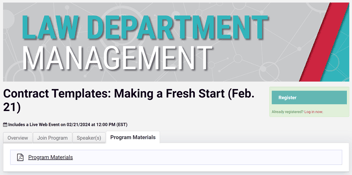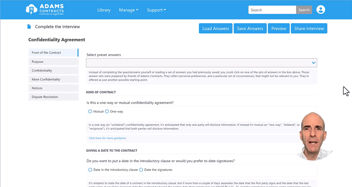
Around 14 years ago, with help from my friends at Contract Express (before it was acquired by Thomson Reuters), I built my first highly customizable document-automation template, for creating confidentiality agreements. It was the precursor of Adams Contracts' first template. It wasn't a grand success. A recurring theme: "Too many questions!", with me as the Riddler.
Fast forward to a few months ago. I convened a group of volunteers to help with developing our new service agreement template. Things went swimmingly until I gave them the opportunity to test-drive an early version of the template. Only one person gave me some helpful comments. From the rest, silence.
Last month, a few LinkedIn contracts people agreed to try out the template. Two people ended up looking at it. Again, from the rest, silence. Of the two who looked at it, one said "I found it hard to not be frustrated with all the questions." The other said, "I think I saw one of your posts about the template recently and how many questions there were. I must admit I probably would have abandoned the process if using this for regular drafting."
So what we have here is Too Many Questions!: Part Deux. A couple of days ago I found myself in an "Am I taking crazy pills" frame of mind over it, but I think the explanation is simple.
Those who volunteered were willing to kick the tires, not take part in the Dakar Rally. Our templates are for those who want a fresh start. Necessarily, using our template to make a fresh start requires that you think through what you want your deal to look like. That takes time—more time than someone just trying to help me out is likely to be willing to spend. So I apologize to my volunteers for being unrealistic about what I could expect from them.
For anyone who just wants to dip into the template and isn't picky about what output document they look at, it might be appropriate for me to create a version with default answers provided for all questions. On the other hand, I don't know that anyone would benefit from that sort of cursory overview.
If someone using one of our templates for a fresh start is unhappy about the number of questions, there's an easy fix: hire LegalSifter to help complete the interview. Or if you need specialist help, hire a specialist of your own. Perhaps one of our specialists—for the service agreement template, Noelle McCall (insurance) and Ned Barlas (intellectual property). Why would you instead want to have less choice, or use someone else's random answers?
And the drafting gods would like you to remember that once you've gone through the interview once, you can reuse your answer set, making only those adjustments that are appropriate for the new transaction. So the plaintive cry of "Too many questions!" is well and truly irrelevant after you've gone through the interview once.


